This was supposed to be Wooden Overcoats’ year. The team behind this British independent audio sitcom had successfully crowdfunded their fourth and final season and planned to launch it on September 24, 2020, the show’s fifth anniversary. There were going to be 10 episodes and a Halloween special rather than the usual eight, and it would all have been lovingly performed, recorded, edited, and scored by the podcast’s extremely dedicated team.
As he sat down with director-producer Andy Goddard in early March to put the finishing touches to the very complicated production schedule, head writer David K. Barnes had only just begun to get an inkling that the show’s passionate fan base might have to wait a little longer than expected for the characters’ final outing.
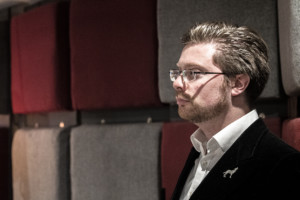
“I remember working with Andy on this recording schedule and sending it to all the actors,” he says as we speak over Zoom. “And as it’s going along and gets closer and closer and closer, I’m going ‘’I’m not sure if we can do this, but it’s a lovely timetable—we can’t throw this out!’”
Unfortunately, that beautifully crafted schedule, along with everything else that was supposed to happen in 2020 but didn’t, has been put on hold. With the coronavirus pandemic building and the UK entering a national lockdown, it just wasn’t safe to ask a cast of at least 10 actors, some of whom are over the age to be considered “at risk,” to get into a studio together at the same time. Six months and more later, that hasn’t changed.
“I think the hope exists that Wooden Overcoats season four can get recorded maybe in 2021? But we are constantly reviewing, reviewing, reviewing,” Barnes says. “We are certainly not ever going to make this show in any circumstances in which it could be an iota unsafe for anyone involved.”
When Wooden Overcoats debuted in the autumn of 2015, it was the same ambition and scale— that now makes it so difficult to adapt for the era of social distancing—that made the show stand out. It had a large cast of professional actors, an original score recorded by an orchestra assembled just for the show, and a writers’ room staffed by some serious talent from the world of theatre. At a time when it was the norm for audio fiction to be structured to work for one or maybe two voices—such as with the highly popular Welcome to Night Vale—Wooden Overcoats sounded utterly different.
“I was sort of lounging around on the sofa in a dressing gown, trying to will work to happen, which clearly succeeded because Felix walked in and said that he and Tom had come up with this idea.”—Barnes
Even five years later, the show’s story and style sets it apart from the majority of fiction and drama podcasts. None of the tropes, settings or themes that we’ve come to expect from the audio fiction space are present: Wooden Overcoats isn’t darkly dramatic or supernatural or historical or set in space. It’s a light-hearted comedy set on a fictional island in the English Channel starring an eccentric pair of siblings who run the community’s funeral home—hence the show’s title, Wooden Overcoats, which is an old-fashioned slang term for a coffin.
These two central characters, Rudyard and Antigone Funn, mostly hate each other and everybody else, but their family has been in the undertaking business in the village of Piffling Vale for generations and they miserably muddle through. Until the day, that is, when a competitor turns up. As the show’s tagline succinctly puts it with regard to their funeral home: “It used to be the only one. It isn’t anymore.”
All of the conflict required for a successful comedy is contained within that dynamic, because with the arrival of a rival funeral director in Eric Chapman, the Funn siblings suddenly have to up their game if they want to stay in business. Chapman is personable, even sexy, while Rudyard and Antigone are awkward and eccentric (she is especially fascinated by embalming fluids and talks of little else). The other inhabitants of Piffling Vale are quickly won over by the attractive newcomer, leaving the Funns scrambling to book even a single funeral.
The initial idea for a gentle, witty podcast sitcom about competing undertakers came from Felix Trench and Tom Crowley, who play Rudyard Funn and Eric Chapman on the show. At the time, Trench and Barnes were roommates in Brixton, south London, and as a young writer trying to make it in London’s theatrical world, Barnes says he was extremely ready for a new project. “I was sort of lounging around on the sofa in a dressing gown, trying to will work to happen, which clearly succeeded because Felix walked in and said that he and Tom had come up with this idea,” he explains.
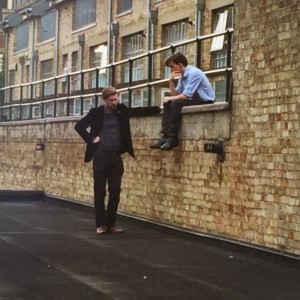
It was the end of summer 2014 and Serial had just taken the audio world by storm. While Trench and Crowley had initially thought their story could become a short film, the budget required to do that and the new buzz around podcasting persuaded them that audio was a more obtainable route. Barnes quickly put some initial ideas down, including the scenario and a rough outline of the first episode, and the trio continued to refine the concept together.
Barnes soon found that Wooden Overcoats was the perfect vehicle for something he had long wanted to write about. “I really wanted to delve into the theme of jealousy, especially professional jealousy, and how self-destructive that can be,” he says.“And of course, in drama that’s deeply tragic and in comedy, I thought it could be deeply funny.”
Another key aspect of the show came from Trench, who even in 2014 was thinking about a global audience. Wooden Overcoats is narrated by a mouse named Madeleine (played by veteran British actor Belinda Lang) who lives at the Funns’ funeral home and records all of the chaos there for her bestselling memoir. There was quite a “cynical podcast-y reason” for including this framing device, Trench says.
“The reason for Madeleine was I thought that if we had a narrator character, it would ease in the Americans because they’d only had [Welcome to] Night Vale and single-person narration at the time,” Trench says. Barnes adds that “having a narrator who can explain little bits of lore here and there is very funny and very useful.”
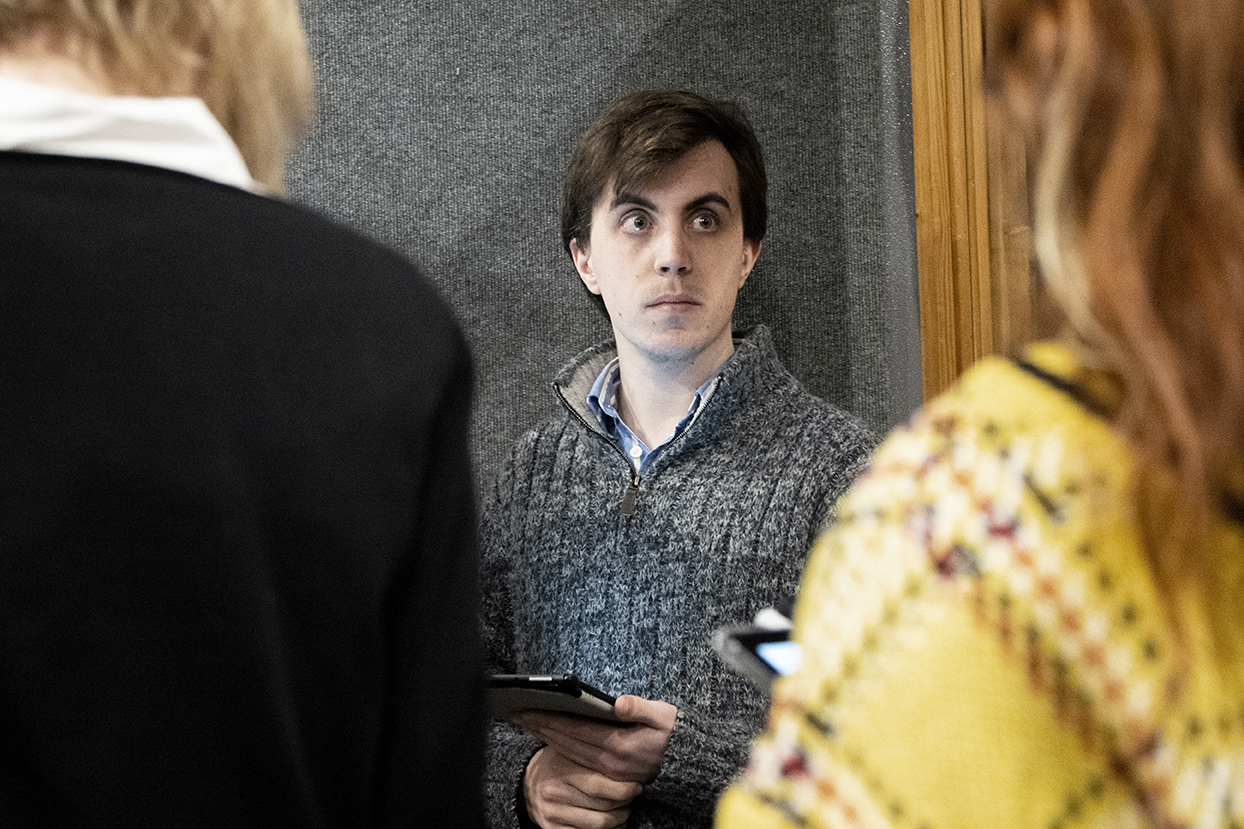
Many of the cast and crew, including Trench and Barnes, also work in theater, so it follows that live shows have been a big part of Wooden Overcoats from the start. Once they were ready to start releasing season one, they booked the upstairs room at a pub near Waterloo Station (“purely because you could have the space for free on a Monday night if the audience spent £200 at the bar,” Trench explains) and started performing live versions of the podcast episodes as they came out weekly on the feed.
Barnes adapts the podcast scripts specially for the live shows. “Every time, I tweak them and rework material,” he says. “The rhythm of jokes and the rhythm of dialogue in a non-audience facing show that was always written to be done in a studio is very different from live. So I try to take some jokes out, put others in, do visual jokes as well, that sort of thing.” The actors improvise movements and facial expressions in character, too, which helps to make it a different experience to the podcast.
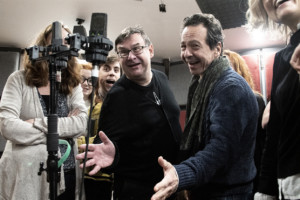
It was at one of those early shows that they got the first hint that the podcast was reaching people beyond their friends and colleagues. “On the third one, there was a man wearing a hat in the audience that none of us recognised,” Trench says. “That was our first inkling that there might be people from outside our friend group who’d somehow found the show.” From there, the audience grew steadily as the show began to be written about as part of a new wave of post Serial podcasts.
Given that crowdfunding was common for indie theater productions in the UK at the time, it was the obvious route for continuing the show without other funding options. “I wouldn’t know where to find a venture capitalist and I’d be terrified if I did,” Trench says. Their campaigns on Kickstarter and later Indiegogo have remained central to the show’s business model, although he explains that this revenue doesn’t fund the whole enterprise by any means.
“Crowdfunding only makes up part of our budget, I think it’s about half. And then the rest is live show tickets, merchandise, selling extra episodes online,” he says. Having their special episodes available on a “pay what you want” basis is also crucial, Barnes adds, because it provides a regular flow of income that covers running costs when they’re not producing a season.
Wooden Overcoats has been able to grow an audience and run successful crowdfunding campaigns because it’s a well-written, tightly produced podcast that listeners enjoy. But there’s something else at work too. Everything the team has done to promote the show, from encouraging fans to share their drawings of Rudyard and Antigone Funn to booking well-known British television actors like Caroline Quentin and Hugh Fraser as guest stars, seems to stem from two guiding principles: be nice, but be persistent.
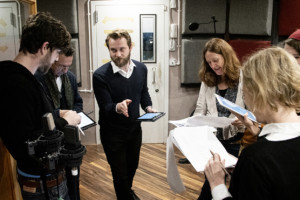
Trench is especially good at striking this balance. He tried all sorts of ways to get mainstream publications to take notice of the podcast when it first launched, from sending well-designed media packs to radio critics (this is how I first came to know of the show and how I ended up naming it one of my best podcasts of 2016) to standing outside BBC headquarters in central London in the rain handing out flyers to everyone who passed in the hope that they might cover it.
They also made a lot of friends in the audio drama community, driven by a genuine desire to be included. As a strategy, it has served them very well, but they didn’t set out to “network” so much as just connect with their peers. “We stumbled on it, and it really kind of kicked off—intentionally soft-peddling promotion and focusing more, especially in the online arena in those first couple years, on supporting other podcasts and trying to make friends and and find people who were doing similar sorts of things,” Trench says. “That’s literally going and having a drink with someone whose work you like. It’s worth so much later down the road. But only if you do it non-cynically. It’s one of those ‘rising tide lifts all boats’ things.”
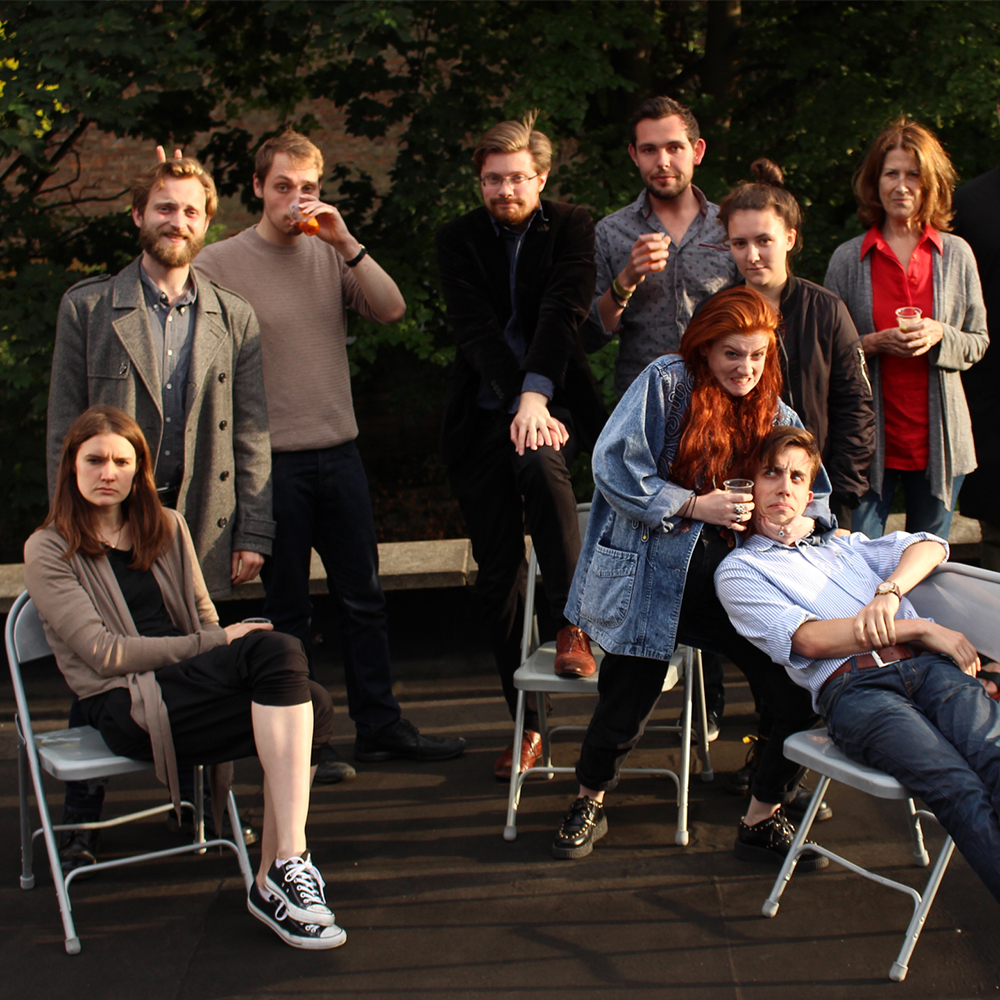
Their ties in that community have never been more important than in this year when all their plans for their final season had to be postponed indefinitely, Barnes says. “That did take the stuffing out of the year, amongst many other things, like not being able to go anywhere and living in fear of a virus.” Creators who could keep producing through the pandemic stepped up, inviting the cast and crew of Wooden Overcoats to work on other shows until their own recordings could resume, and listeners have continued to be supportive and dedicated to the show.
What on the surface seems like a silly sitcom about fictional undertakers has actually come to represent something much deeper in the lives of those who make it. “It’s about the communication of ideas and experiences and emotions and compassion,” Barnes says. “And those virtues are still coming out louder than ever this year, even though we can’t actually record the show.”




Comments